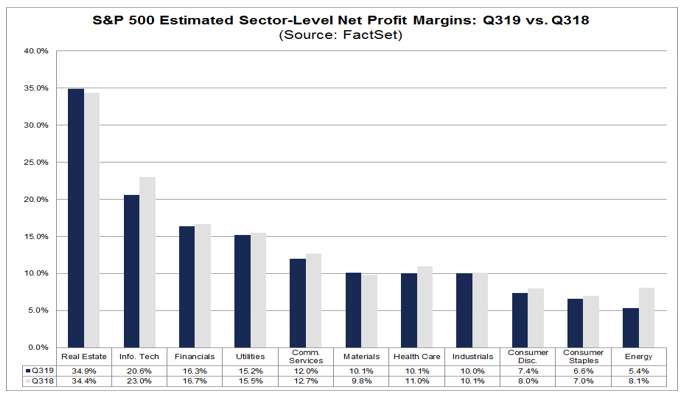-October 11, 2019 Weekly Capital Market Update. For the first time in four weeks, all U.S. equity indexes finished positive on news of improved China-U.S. trade relations: S&P 500 Index increased +0.62%, the Dow Jones Industrial Average was up +0.91% and the Nasdaq rose +0.93%. The White House announced the suspension of tariffs scheduled for next Tuesday on $250 billion worth of Chinese imports, and in turn, China agreed to purchase between $40-$50 billion of U.S. agricultural goods. Further, President Trump said that the U.S. and China had “agreed in principle” on a preliminary deal and added “we are very close to ending the trade war.” However, this “first stage” agreement has no impact on the preexisting tariffs costs and related negative ramifications on economies of both the U.S. and China. Next week market focus will be on the early company releases as earnings season starts; expectations are, once again, muted due to the preexisting tariff regime that has yet to be resolved.
-October 4, 2019 Weekly Capital Market Update. The equity returns for the week were mixed as the Nasdaq gained +0.54% while the S&P 500 Index and Dow Jones Industrial Average posted losses of -0.33% and -0.92%, respectively. Through September, the S&P 500 Index posted a year-to-date gain of 19%, its best performance since 1997. The U.S. economy continues to reflect on-going tariff-related stresses with 3rd quarter growth estimates ranging from as low as a 1.3% annualized rate to as high as a 1.9% pace. The economy grew at a 2.0% pace in the 2nd quarter, slowing from a 3.1% rate in the January-March period. Remarkably, robust U.S. employment hit a new milestone with the economy adding 136,000 jobs in September, moving unemployment down to 3.5% (the lowest level since December 1969). Unemployment rate usually rises ahead of a recession, so continued declines pushes out the timeline for any potential recession into late 2020. The markets were also impacted by a negative overhang related to political uncertainty in Washington after the Democratic-controlled U.S. House of Representatives impeachment inquiry against Trump, along with news that manufacturing shed 2,000 jobs last month - the first decline in factory payrolls since March.
